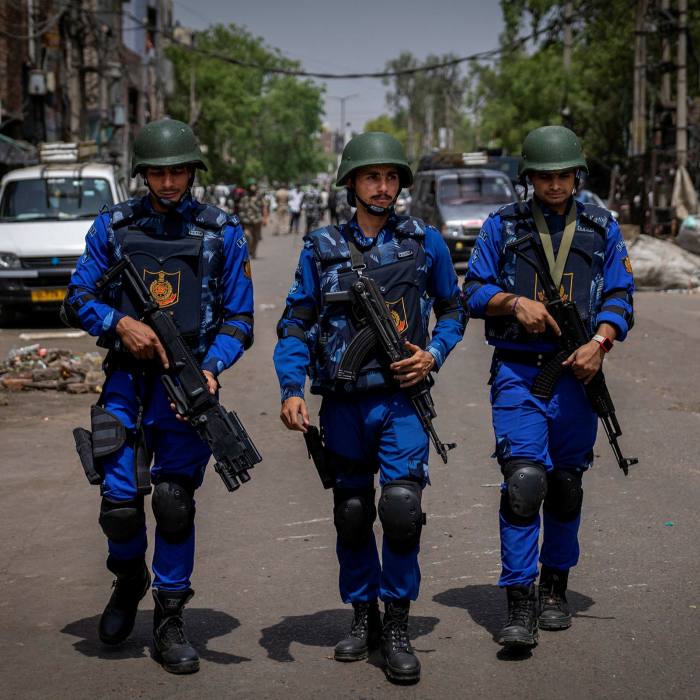‘Politics has been turned on its head’: India reels from wave of religious violence
The main road in Jahangirpuri, a bustling working-class neighbourhood in the north of India’s capital Delhi, is deserted, blocked off by barricades and dozens of camouflaged riot police.
Sabira Bibi, a 39-year-old wearing a light orange cotton shawl, has made three trips a day to the barricades to ask the officers when she will be allowed back to her damaged soft drinks stall, set among the debris on the empty street.
“Police tell me to wait,” Bibi said. “But how can I live without the daily Rs100 ($1.30) that I earn from my stall?”
Jahangirpuri is one of several areas hit by a wave of alarming Hindu-Muslim violence that has spread across India in recent weeks. But critics say that, rather than defuse the tension, Narendra Modi’s Hindu nationalist Bharatiya Janata party has tacitly enabled hardline Hindu groups while cracking down on Muslim communities.
Several riots erupted when some participants in Hindu religious processions allegedly brandished weapons and chanted anti-Muslim slogans as they passed through largely Muslim neighbourhoods. They were reportedly pelted by stones.
About a dozen incidents took place in around eight states in April, according to newspaper reports, from BJP-ruled Gujarat and Madhya Pradesh to opposition-controlled states such as Rajasthan. Dozens have been injured and arrested, while two people were killed.

India has a long and bloody history of religious violence, from an estimated 1mn deaths at the time of the subcontinent’s 1947 partition to as recently as February 2020, when more than 50 people were killed in clashes in Delhi.
But now confrontations are taking place with “greater frequency. One clash is triggering clashes in another place,” said Sanjay Kumar, a professor at the Centre for the Study of Developing Societies. The frequency of the skirmishes pointed to the deep “loss of trust between Hindus and Muslims”, he added.
Modi, who was chief minister of Gujarat when more than 1,000 people, mostly Muslims, were killed in riots in 2002, has not commented directly on the recent strife. In a recent speech, he referred to the importance of “India’s unity”.
In Jahangirpuri and other affected areas, local BJP authorities ordered the bulldozing of allegedly unauthorised Muslim-owned buildings, which human rights lawyers and others argued amounted to illegal state retribution. Bibi’s stall was among the damaged structures.

Lawyers said it was the latest example of the rising intimidation and harassment of India’s 14 per cent Muslim population under the BJP. The party considers India a Hindu homeland and, opponents maintain, has used polarising policies and dog-whistle statements to target Muslims.
Other incidents include bans on schoolgirls wearing headscarves in one BJP-ruled state to conspiratorial “love jihad” laws that restrict interfaith marriages across swaths of the country.
“Politics has been turned on its head,” said Neera Chandhoke, a former professor of political science at Delhi University, adding that such incidents had become more common under the BJP. “Nobody targeted Muslims on an everyday basis.”
The BJP and its supporters reject that they have enabled violence or retaliated against Muslims, arguing that local authorities simply acted to defend Hindu devotees.
Several BJP-ruled states faced attacks against “religious processions of [the] Hindu community”, said Gaurav Bhatia, a national BJP spokesperson. Those “have been dealt with an iron hand and strict action has been taken against perpetrators”. Bhatia added that BJP authorities had worked to defuse religious tension by creating groups for dialogue. “Normalcy has been restored,” he said. “BJP-ruled states have better law and order situations and less crimes committed.”
Kumar, the professor, said the BJP had tapped into a suspicion among many Hindus that other parties historically sided with Muslims to secure their votes. The BJP argued that rivals “have always neglected even the very reasonable demands of the majority community”, he said.
The violence began in Rajasthan’s Karauli district on April 2. Violence broke out as a procession to celebrate the Hindu new year passed through a Muslim neighbourhood where they were allegedly pelted with stones by locals.
In several incidents, crowds of Hindus carried swords, climbed on top of mosques and chanted provocative slogans.
This month’s violence coincided with a flurry of diplomatic activity as India hosted several foreign leaders, from UK prime minister Boris Johnson to Ursula von der Leyen, European Commission president.
Yet they too did not comment on the violence, which analysts said showed their unwillingness to challenge India’s human rights record at a time when countries were trying to persuade New Delhi to reconsider its neutrality on Russia’s invasion of Ukraine.
Johnson was criticised for being pictured on a JCB bulldozer at an Indian factory soon after the demolitions in Jahangirpuri. Amnesty India said his visit was “not only ignorant but his silence on the incident [was] deafening”. Johnson later said he privately raised “difficult” issues with India.
Days after the violence in Jahangirpuri, the BJP-run North Delhi Municipal Corporation ordered the demolition drive. It was halted within hours by the Supreme Court after a legal challenge, with a ruling due next month.
Residents of Jahangirpuri, a mixed religious neighbourhood with a mosque and Hindu temple on the main road, said the violence was unprecedented. “There was chaos,” said Sudarshan Prasad, a 71-year-old Hindu. “We have always lived here in peace. This has not happened in the last 40 years.”


